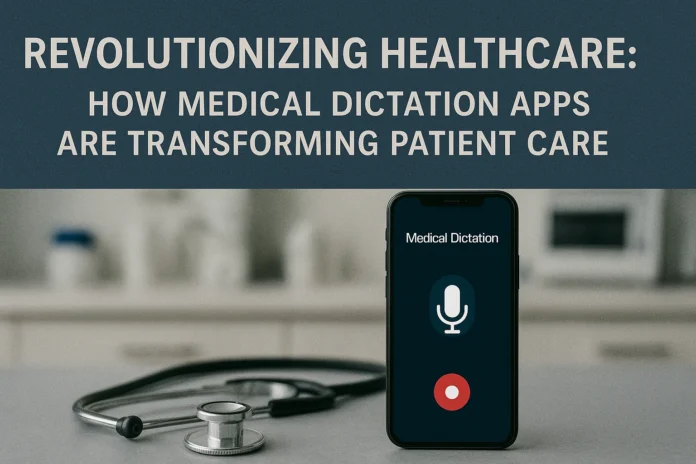The healthcare industry has long been on the cusp of technological innovation, seeking solutions that enhance efficiency and patient care quality. Among the recent strides in health technology, medical dictation apps have emerged as a pivotal tool in streamlining clinical workflows and improving record accuracy. These applications leverage advanced speech recognition to convert voice into precise electronic text, enabling healthcare providers to maintain comprehensive and timely patient records. By reducing the administrative burden on clinicians, these tools allow for more focused patient interactions and improved overall care. Below, we will explore the multifaceted impact of medical dictation tools in the healthcare landscape.
Revolutionizing Healthcare: The Impact of Medical Dictation Apps on Patient Care
A medical dictation app has transformed patient care by making documentation faster, more accurate, and more accessible. Instead of spending hours typing or interpreting handwritten notes, healthcare providers can dictate directly into their devices, reducing errors and ensuring more detailed records. This accuracy supports better diagnoses, treatment plans, and follow-up care, ultimately improving patient outcomes.
By minimizing time spent on paperwork, clinicians can focus more on patients, leading to stronger communication and satisfaction for both sides. Integration with electronic health records keeps files updated and accessible to the entire care team, enabling more coordinated, personalized, and effective care.
Enhancing Doctor-Patient Interactions with Speech Recognition Technology
Speech recognition technology in medical dictation transforms doctor-patient interactions by enabling accurate transcription of spoken language into text. Physicians can maintain eye contact and engage more fully with patients, strengthening communication and trust. Real-time documentation allows healthcare providers to capture details immediately, improving record accuracy and streamlining consultations, which reduces waiting times for others.
The technology’s adaptability to accents, dialects, and medical terminology makes it valuable across diverse patient populations and professional settings. It also supports mobility, allowing providers to dictate notes during hospital rounds or in fast-paced environments such as emergency rooms, where efficiency and responsiveness are critical.
Medical Dictation Apps: A Game Changer for Clinical Documentation Efficiency
Clinical documentation is essential for maintaining quality and continuity in healthcare. Medical dictation apps have reshaped this process by replacing traditional transcription with digital solutions that deliver immediate and accurate text output. This shift reduces administrative workload, allowing providers to focus more on patient care, research, and professional growth.
Integration with EHRs strengthens these benefits by minimizing duplicate work, reducing data entry errors, and ensuring seamless updates across platforms. For specialists, advanced dictation tools also support embedding images and charts directly into records, enriching case documentation and fostering collaboration. These innovations contribute to a more efficient and precise healthcare environment centered on patient well-being.
The Role of AI in Medical Dictation and Its Benefits for Healthcare Providers
Artificial intelligence (AI) forms the backbone of modern medical dictation apps, elevating their performance and adaptability. These tools continuously learn medical terminology and user preferences, improving transcription accuracy with time. By understanding context, AI distinguishes between homonyms and minimizes errors that could affect treatment.
Beyond transcription, it streamlines documentation by structuring notes with templates and flagging inconsistencies. Advanced systems may even support diagnostics by analyzing dictated records for guidelines or drug interactions. Predictive text and auto-complete features accelerate note-taking while maintaining personalization and precision. Through these capabilities, AI-driven dictation enhances efficiency, accuracy, and the quality of medical documentation.
Privacy and Security Considerations in the Use of Medical Dictation Software
The growth of medical dictation software raises critical concerns around privacy and data security, as these tools process highly sensitive patient information. Compliance with regulations like HIPAA is essential to ensure confidentiality and data integrity. Reputable providers implement strong encryption and secure storage to protect information both in transit and at rest, while healthcare organizations must train staff to prevent accidental breaches.
Regular updates and maintenance are required to address vulnerabilities, with developers expected to anticipate emerging cybersecurity threats. As dictation apps integrate into healthcare IT systems, clear protocols and vendor transparency on data handling, along with rapid incident response, remain vital to maintaining trust and safety.
Overall, medical dictation apps stand out as an essential technological advancement with the potential to significantly enhance the quality of care provided by healthcare systems. These powerful tools foster efficiency, accuracy, and security in patient documentation while streamlining communication among various stakeholders in the healthcare ecosystem. The ongoing integration of AI and speech recognition technology holds the promise of further breakthroughs in patient care, emphasizing the pivotal role of innovation in the pursuit of health and well-being.



